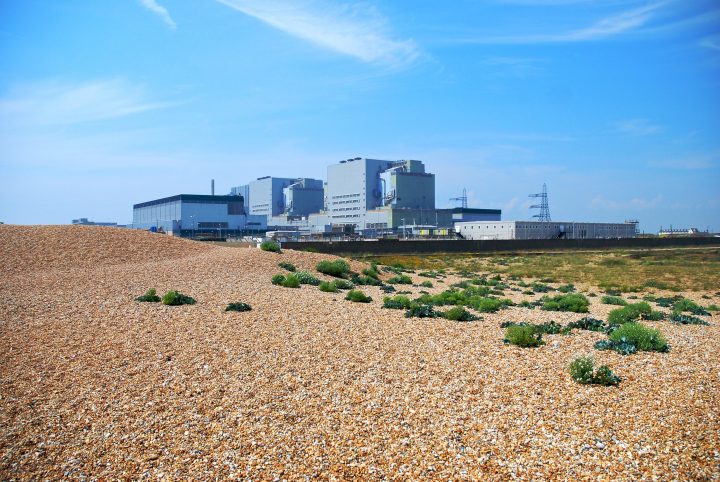Nuclear energy is the energy that is released by reactions inside an atomic nucleus. When we talk about nuclear energy, we are often referring to nuclear power – electricity generated inside a nuclear reactor.
The main benefit of nuclear energy is that it can produce large amounts of electricity without burning any fossil fuels. This makes it a clean and carbon free energy source, unlike coal, oil, and natural gas.
There are two main methods of producing nuclear energy. These are nuclear fission and nuclear fusion. The way they work differs greatly, so let’s take a look at them below.
Nuclear Fission
Most nuclear reactors in use today are based on ‘nuclear fission’ technology. Inside these reactors, neutrons are fired into larger atoms. This makes each atom split into two smaller atoms, releasing large amounts of energy in the process. Uranium atoms are typically used inside fission reactors with some using plutonium instead.
When atoms split inside a fission reaction, other neutrons are released which can set off a chain reaction. This means nuclear fission can be sustained for long periods of time, making it very reliable.
The smaller atoms produced by nuclear fission are known as ‘fission products’. Also known as ‘spent fuel’, these are highly unstable and feature various radioactive isotopes, making them extremely hazardous. Fission products are classified as high-level nuclear waste and can pose a danger for thousands of years.
Energy from nuclear fission is used to boil water and produce steam. The steam is then used to drive a turbine in order to generate electricity. This process is very similar to that of traditional power plants.

What About Nuclear Fusion?
Fusion is a more radical approach to nuclear energy. Instead of splitting an atom, it joins (or ‘fuses’) two smaller atoms to form a larger one. This is the same process that powers the sun and therefore offers huge potential.
During fusion, a huge amount of energy is released – even more so than nuclear fission. Nuclear fusion has the added benefit of not producing any radioactive fission products, meaning it is much safer.
The main problem with nuclear fusion is that it is very unreliable. To date, scientists haven’t been able to sustain fusion reactions for a long enough period of time to make it efficient.
Nuclear fusion is still largely in the experimental phase with no commercial success to date. Scientists continue to study the technology due to the huge benefits it might one day provide.
The Drawbacks of Nuclear Energy
As we have already noted, most nuclear reactors make use of nuclear fission. This process produces spent fuel known as fission products that contain highly radioactive material. This high-level nuclear waste can remain harmful for thousands of years to come.
Radioactive waste is one of the key challenges for the nuclear energy industry. Removing such waste from a nuclear reactor and storing it is a dangerous and expensive process.
Another drawback of nuclear energy is the potential for a meltdown – most notably seen during the Chernobyl disaster in 1986 and the Fukushima Daiichi disaster in 2011. Whilst the safety of nuclear power increases as time goes by, it still poses a threat.
Nuclear Weapons
Nuclear weapons are another prime example of nuclear energy in action. All nuclear weapons use fission to create their explosion, but modern weapons combine both fission and fusion to create a more powerful explosion.
Nuclear power has its roots in fission weaponry developed in the years just before and during World War II. It was only after the war that scientists began working on peaceful applications of nuclear technology.
How nuclear weapons work is beyond the scope of this article. If this is of interest to you then there is a great article on the topic here.
Overview
So there we have an explanation of what nuclear energy is and some of the benefits and drawbacks it can have.
Whilst nuclear power can be dangerous, it also offers the potential to generate vast quantities of clean energy. This is helping many countries around the world including the United States to cut its carbon emissions. In turn, this helps to improve air quality, conserve natural resources, and curb global warming.
Whether you agree nuclear energy is the right choice is a matter of personal opinion. Many people believe nuclear is just too dangerous and should be banned for good, whilst others believe it is a vital energy source for power generation.